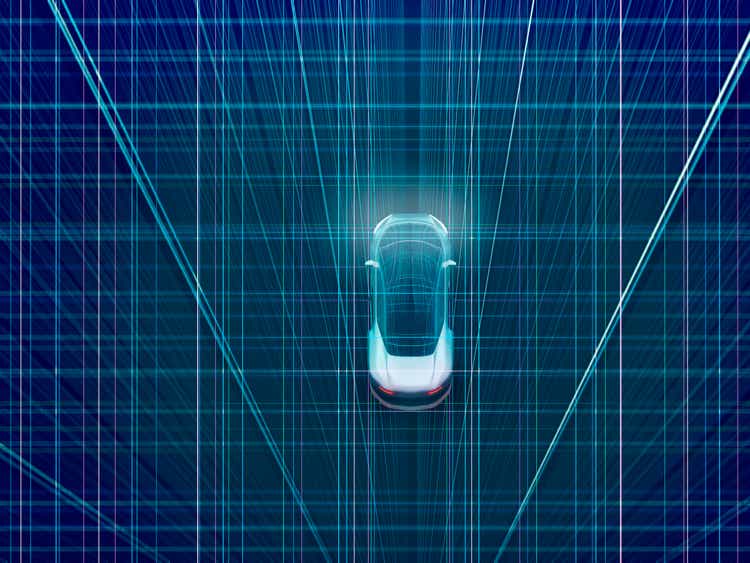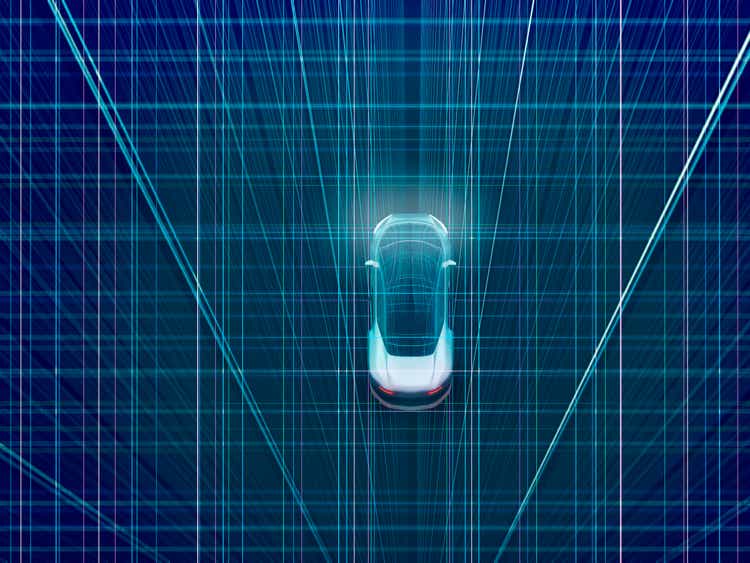
Hiroshi Watanabe
Electric vehicle sales in the U.S. have missed some high-flying expectations, but are still growing at a steady pace. During Q2, EV sales in the U.S. grew by 11.3% year-over-year to reach a record-high volume of 330,4631 units. Looking ahead, U.S. electric vehicle (EV) sales are expected to reach 9% of the market for the full year, according to an updated forecast from J.D. Power. However, that estimate is down from J.D. Power’s prior forecast for 12% EV penetration and shows some flattening of the EV adoption curve.
Automakers have announced pulling back on the aggressive EV production targets this summer, including dramatic shifts from General Motors (GM) and Ford Motor (F). That is despite positive factors such as the opening up of Tesla’s (NASDAQ:TSLA) Supercharger network and mass market and premium BEVs now being at or above parity with gas-powered alternatives in terms of total cost of ownership standpoint (due to aggressive manufacturer incentives, federal and state incentives, and lower operating costs). “An increase in the transition to EVs will take time, with several interdependent variables affecting adoption, but the foundation is growing as consumers try to match vehicle options with their lifestyle,” noted J.D. Power on the EV backdrop.
J.D. Power still expects EV adoption to reach critical mass. After weighing the recent developments, the firm sees EVs making up 36% of the total U.S. retail market by 2030 and 58% by 2035. “The current rate of slower-than-expected sales volume is being driven by a combination of relatively near-term variables that will fade as EV adoption continues to reach critical mass,” highlighted J.D. Power.
Tesla (TSLA) still accounts for just under 50% of all EV sales in the U.S. (based on Q2 reports), but has seen market share challenges pick up from Ford (F), Kia (OTCPK:HYMTF), Hyundai (OTCPK:HYMTF), BMW (OTCPK:BMWYY), and Rivian Automotive (NASDAQ:RIVN). On a global basis, the largest sellers of electric vehicles (BEV and PHEV) are BYD Company (OTCPK:BYDDF), Tesla (TSLA), BMW (OTCPK:BMWYY), Wuling, Volkswagen (OTCPK:VLKAF), Li Auto (LI), Mercedes-Benz (OTCPK:MBGAF), Geely Automotive (OTCPK:GELYF), Huwei’s AITO, Volvo, Audi, Kia (OTCPK:HYMTF), Toyota (TM), SAIC, Hyundai (OTCPK:HYMTF), Changan Automobile, ZEEKR (ZK), Ford Motor (F), and Jeep (STLA). Meanwhile, plug-in hybrid sales continue to surprise and have outperformed all-electric models, with the Mitsubishi Outlander PHEV and Jeep Wrangler 4xe two of the notable outperformers.
European EV data
European electric cars registrations of battery-electric cars declined by 10.8% in July to 102,705 units, according to The European Automobile Manufacturers’ Association. The total market share of BEV vehicles in Europe slipped to 12.1% in July from 13.5% a year before. Despite gains in Belgium (+44.2%), the Netherlands (+8.9%), and France (+1%), Germany’s decline (-36.8%) could not be offset. From January to July, EAMA reported that 815,399 new battery-electric cars were registered, representing 12.5% of the market. Notably, plug-in hybrid car registrations saw a 14.1% decline last month, despite a 3.2% increase in Germany. In July, plug-in hybrids accounted for 6.8% of the total car market, down from 7.9% last year, with 57,679 units sold.
What to watch
There are plenty of EV wildcards to consider for the back half of the year. Tesla’s (TSLA) robotaxi event in October has the potential to disrupt the market as investors get a clearer idea of what the master plan is to compete with Waymo (GOOG), GM’s Cruise (GM), Baidu (BIDU), and Amazon’s (ZOOX). The U.S. election in November could also have a dramatic impact on EV tax credits. While candidate Donald Trump has softened his rhetoric on EVs in general amid heightened political support from Tesla (TSLA) CEO Elon Musk, other Republicans have said that repealing tax incentives is a priority. Analysts are generally mixed on the Trump-Musk factor. Some have also suggested that Tesla (TSLA) could be losing incremental sales due to Musk’s increased political involvement, while others see Tesla (TSLA) having a clear competitive advantage in a non-EV subsidy environment. Both Kamala Harris and Donald Trump have said they would keep tariffs on China imports high. While that could continue to keep Chinese electric vehicle sellers such as BYD Company (OTCPK:BYDDF) and No (NIO) from trying to flood the U.S. market, it also increases the risk of a broader trade war that impacts U.S. automakers selling in China, either directly or through joint partnerships.
